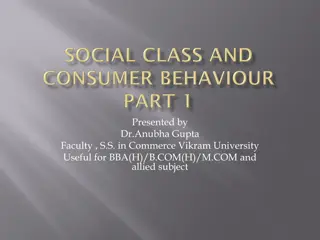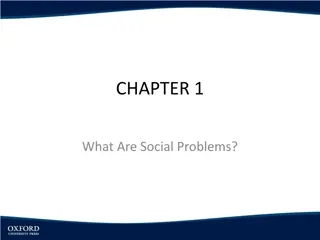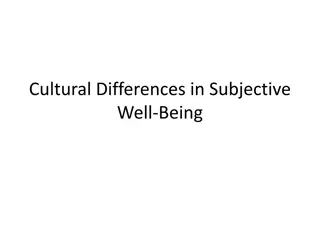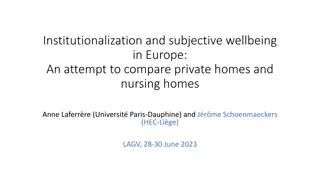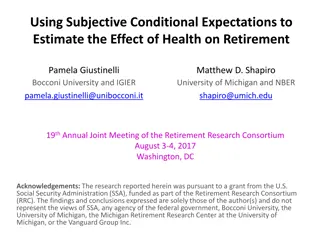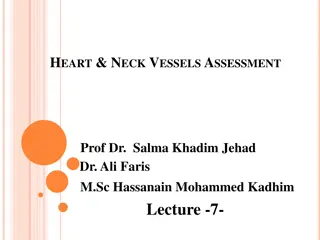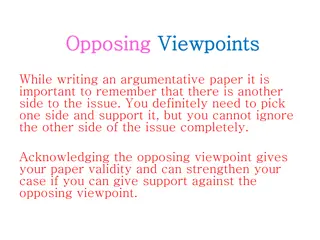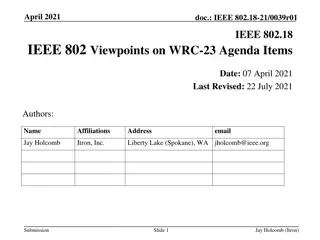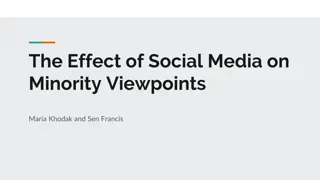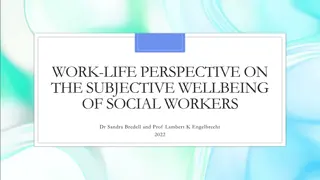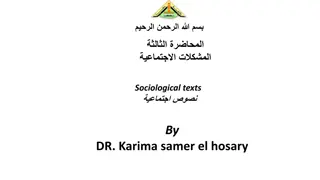Exploring Spiritual Quotient (SQ) and Its Significance in Personal Growth
Spiritual Quotient (SQ) measures an individual's spiritual intelligence and capacity for understanding spiritual concepts. It encompasses attributes like wisdom, transcendence, and humility, emphasizing the spiritual dimension of human experience. SQ, associated with spiritual intelligence, can lead
0 views • 7 slides
Documentation Strategies for Patient Progress in SOAP Notes
Common format for SOAP Notes documentation includes Subjective, Objective, Assessment, and Plan sections. Subjective notes involve patient information and history, while Objective notes detail examination findings. Effective documentation strategies include organization, use of active verbs, and dir
2 views • 33 slides
Understanding Relativism and its Impact on Critical Thinking
Relativism poses a challenge to critical thinking by asserting that truth is subjective and varies from person to person or society to society. While some forms of relativism, like relativity, can be rational, global relativism faces self-referential inconsistency. Values relativism is commonly appl
0 views • 25 slides
Exploring End-of-Life Psychedelic Care with Christine Caldwell
Christine Caldwell, Founder of End of Life Psychedelic Care, introduces a novel treatment model using psychedelics like Psilocybin, MDMA, and Ketamine to ease anxiety, reduce pain, and bring meaning to life. The therapy involves altered states of consciousness, enhancing neuroplasticity and memory r
3 views • 32 slides
Understanding Q-Methodology: A Stata Analysis Overview
Q-Methodology is a research approach focusing on subjective viewpoints. This article discusses the history, goals, and steps involved in a Q-methodology study using Stata programs. It covers the development of a concourse, creation of a Q-sample, Q-sorting activities, and analysis and interpretation
5 views • 46 slides
CASE TAKING STUART CLOSE INSTRUCTIONS
The process of examining a patient for a homoeopathic prescription involves focusing on subjective experiences and symptoms perceived by the patient, rather than general diagnosis and pathology. By understanding the significance of individualized symptoms and modalities, a homoeopathic practitioner
0 views • 24 slides
Understanding Facts and Opinions in Reading Comprehension
Reading comprehension involves distinguishing between facts and opinions in a text. Facts can be objectively proven, while opinions are subjective reflections of personal feelings. Recognizing the difference is crucial for essay writing and critical analysis. By examining cues and asking specific qu
2 views • 9 slides
Understanding Non-Probability Sampling Methods
Non-probability sampling methods involve selecting samples based on subjective judgment rather than random selection. Types include convenience sampling, quota sampling, judgmental (purposive) sampling, and snowball sampling. Convenience sampling picks easily available samples, quota sampling select
2 views • 7 slides
Mental Health Insights Among High-Income Countries Adults in 2016
Explore the prevalence of depression, anxiety, emotional distress, and socioeconomic needs among adults in high-income countries based on the 2016 Commonwealth Fund International Health Policy Survey. The data highlights the rates of mental health diagnoses, subjective experiences of emotional distr
1 views • 10 slides
Cervical Spondylosis: Understanding Symptoms, Evaluation, and Treatment Options
Cervical spondylosis is a degenerative condition of the spine that can lead to neck pain, limited range of motion, and other discomforts. In this case study of an 85-year-old female, the subjective and objective evaluations reveal symptoms and physical findings associated with cervical spondylosis.
1 views • 18 slides
Understanding Social Class and Consumer Behavior
Explore the concept of social class and its impact on consumer behavior across different socioeconomic groups. From subjective to objective measurements, learn how lifestyle choices vary between upper class elites, high-level professionals, and the middle class. Discover how social class influences
0 views • 11 slides
Understanding Social Problems: A Sociological Perspective
Social problems are conditions or behaviors that cause public concern and require collective action. Sociology, particularly in the study of social issues, aims to identify both objective elements like measurable harm and subjective elements like moral evaluations. These subjective beliefs can shape
0 views • 34 slides
Understanding Cultural Values and Perception in Intercultural Communication
Factors such as family, history, religion, and cultural identity significantly influence individuals' decision-making processes and behaviors. Cultural values play a crucial role in shaping perceptions and attitudes towards various issues and events, which can differ across cultures. Recognizing and
2 views • 31 slides
Text Type Focus: Interviews
Interviews in English Language and Literature aim to entertain readers, fulfill their curiosity, and provide new insights on various topics. They typically follow a question-answer format and may present a mix of reported and direct speech. Interviews can cover a single topic or multiple subjects, w
1 views • 10 slides
Comprehensive Overview of Problem-Oriented Medical System in Physiotherapy Assessment
In the realm of physiotherapy assessment, the Problem-Oriented Medical System (POMS) plays a vital role in accurately defining patient problems, creating treatment plans, and monitoring progress. This system, pioneered by Weed in 1968, consists of Problem-Oriented Medical Records (POMR), auditing, a
2 views • 34 slides
Understanding the Importance of Positive Psychology and Subjective Well-Being
Positive psychology emphasizes the significance of happiness, satisfaction, and well-being in people's lives. Subjective well-being (SWB) focuses on individuals' evaluations and feelings about their lives rather than just objective conditions. Enhancing SWB is not only about feeling better but also
1 views • 48 slides
Cultural Contrasts in Subjective Well-Being: Factors and Values
Societies exhibit varying levels of well-being influenced by factors such as wealth, stability, and culture. Economic development, social stability, and individualist-collectivist values play crucial roles. Broad socioeconomic indicators like GDP and life expectancy impact well-being significantly.
1 views • 49 slides
Understanding the Socio-Cultural Impacts of Tourism
The socio-cultural impacts of tourism on host communities can be both positive and negative. Tourism can influence local identities, values, and traditions, leading to changes in behavior and community structures. While tourism can create job opportunities and foster cultural pride, it may also resu
0 views • 28 slides
Objectivity, Value Judgement, and Theory Choice in Science
Thomas Kuhn's work explores the subjective elements in theory choice, highlighting that theory selection is not solely based on objective algorithms. He discusses the structure of scientific revolutions, where science shifts between normal and revolutionary phases. Kuhn's ideas have faced criticisms
6 views • 19 slides
Understanding SOAP Notes in Medical Documentation
A SOAP note is a vital tool for communicating health care information between providers about a patient. It consists of Subjective, Objective, Assessment, and Plan sections, providing a snapshot of a patient's healthcare encounter. This note serves as a common language for healthcare communication.
0 views • 25 slides
Understanding the Concept of Nation and Ethnic Identity
The concept of nation is deeply rooted in emotional, material, and moral investments, leading to a strong sense of belonging. Various scholars present different perspectives on nationhood, from sentimental and political processes to the debate on whether a nation is a political or cultural entity. N
1 views • 15 slides
Exploring English Literature through B. Prasad's Perspective
Delve into the study of English literature through the insightful division laid out by B. Prasad, covering poetry, drama, and prose. Gain a deep understanding of subjective and objective poetry, various poetical types, stanza forms, and different schools and movements in literature.
0 views • 14 slides
Exploring Writers' Viewpoints Through Music Texts
Dive into a lesson on evaluating writers' viewpoints and perspectives using music texts like Katy Perry's "Chained to the Rhythm." Understand the techniques writers use to convey their ideas and messages, and apply evaluation skills to analyze lyrics effectively.
0 views • 12 slides
Group Decision-Making: The Wisdom of Crowds and Stupidity of Herds
This presentation by Richard Zeckhauser of Harvard University delves into the importance of rational analysis and subjective probability in group decision-making processes. It emphasizes the need to focus on collective wisdom while avoiding biases that can affect group decisions. Key concepts covere
2 views • 22 slides
Understanding Nationalism in Political Science
Nationalism, a complex concept, defines the nation as the fundamental unit of political rule. It encompasses a mix of objective and subjective factors, including cultural, ethnic, and political traits. The definition of a nation is subjective, based on how its members perceive themselves as a distin
0 views • 27 slides
Effectiveness of Psychological Intervention in Managing Stress and Depression Among Cancer Patients
A study was conducted to assess the effectiveness of a psychological intervention program in managing stress, depression, and subjective well-being among cancer patients. The study involved 132 cancer patients aged 35 to 65 years, with 72 patients in the experimental group receiving psychological in
1 views • 48 slides
QBism and Convivial Solipsism in Quantum Interpretations
QBism and Convivial Solipsism present different interpretations of quantum mechanics, focusing on the subjective nature of probabilities and experiences within the quantum formalism. QBism emphasizes the subjective interpretation of probability, considering the quantum state as a tool for assigning
0 views • 30 slides
Exploring EFL Teachers' Subjective Theories on Pronunciation Training
This study delves into EFL teachers' subjective theories regarding pronunciation training, with a focus on Internet-supported practices. Through semi-structured interviews, 11 high school EFL teachers shared their views and attitudes on the importance of pronunciation training in EFL classrooms, as
0 views • 13 slides
Comprehensive Guide to Abdominal Assessment for Healthcare Professionals
This lecture by Hassanain Mohammed Kadhim covers the essential techniques and subjective data needed for a thorough abdominal assessment. It includes objectives, equipment required, preparation steps, subjective data collection, inspection guidelines, abdominal landmarks, common causes of abdominal
0 views • 21 slides
Comparative Analysis of Institutionalization and Subjective Wellbeing in Europe
This study explores the impact of institutionalization on subjective wellbeing in Europe, comparing private homes and nursing homes. The research examines the desire to avoid nursing homes, especially heightened by the COVID-19 pandemic, and investigates the wellbeing of older Europeans in different
0 views • 14 slides
Causal Effects of Health on Retirement Using Subjective Conditional Expectations
This research explores the impact of health on retirement decisions by analyzing subjective conditional expectations of older workers. By studying the relationship between health, work, and retirement planning, the study aims to provide insights into policy implications for ensuring the future solve
0 views • 19 slides
Understanding Key Concepts of Insurance
Key notions of insurance include fortuitous loss, risk occurrence, loss exposure, objective and subjective risk, and the law of large numbers to predict future loss experience. Objective risk is based on actual loss variation, while subjective risk is based on individual perception. Understanding th
0 views • 26 slides
Heart and Neck Vessels Assessment Overview
This information presents a comprehensive guide for heart and neck vessels assessment, including objectives, necessary equipment, preparation steps, subjective data to consider, techniques for palpating and auscultating the carotid artery, normal findings, and more. It emphasizes the importance of s
0 views • 23 slides
Cognitive Study of Subjectivity Extraction in Sentiment Annotation
A cognitive study on extracting subjectivity in sentiment annotation, exploring if humans perform subjective extraction similarly to machines for sentiment analysis. The study investigates sentiment oscillations and different methods adopted based on the nature of subjective documents.
0 views • 14 slides
Exploring The Viewpoints Method in Theater
Explore the Viewpoints method in theater, focusing on space, time, shape, kinesthetic sensation, and more. Discover how this method enhances presence, perception, and creativity in performance, emphasizing the importance of immediate experience and response.
0 views • 10 slides
Understanding and Addressing Opposing Viewpoints in Argumentative Writing
When writing argumentative papers, it's crucial to consider and acknowledge the opposing viewpoint to strengthen your argument. This process adds validity to your case and demonstrates a comprehensive understanding of the issue. By addressing opposing arguments effectively, you can enhance the impac
0 views • 6 slides
IEEE 802 Viewpoints on WRC-23 Agenda Items
This document presents IEEE 802's viewpoints on Agenda Items related to current IEEE 802 standards activities for the WRC-23. It reflects the perspectives of IEEE 802 and provides insights on various AI topics such as frequency bands and IMT multiple bands. The document offers analysis and considera
0 views • 9 slides
Influence of Social Media on Minority Viewpoints and Critical Mass Theory
Exploring the impact of social media on minority viewpoints and how groups with minority opinions can overturn majority ideas using Critical Mass Theory. The study delves into the relationship between social media and the spread of minority views, emphasizing the potential for influencing the majori
1 views • 19 slides
Understanding Subjective Wellbeing of Social Workers in South Africa
Gain insights into the subjective wellbeing of social workers in South Africa within the context of work-life balance. Explore perceptions of work-life balance and subjective wellbeing, aiming to provide recommendations for improving the overall wellbeing of social workers. The study uses theoretica
0 views • 24 slides
Evolution of Sociological Perspectives on Social Problems
The study of social problems has evolved dramatically since the 1970s, shifting from an objectivist approach to a more subjective and constructionist perspective. This shift acknowledges that what is considered a social problem is a matter of definition, and focuses on the social processes involved
0 views • 12 slides










